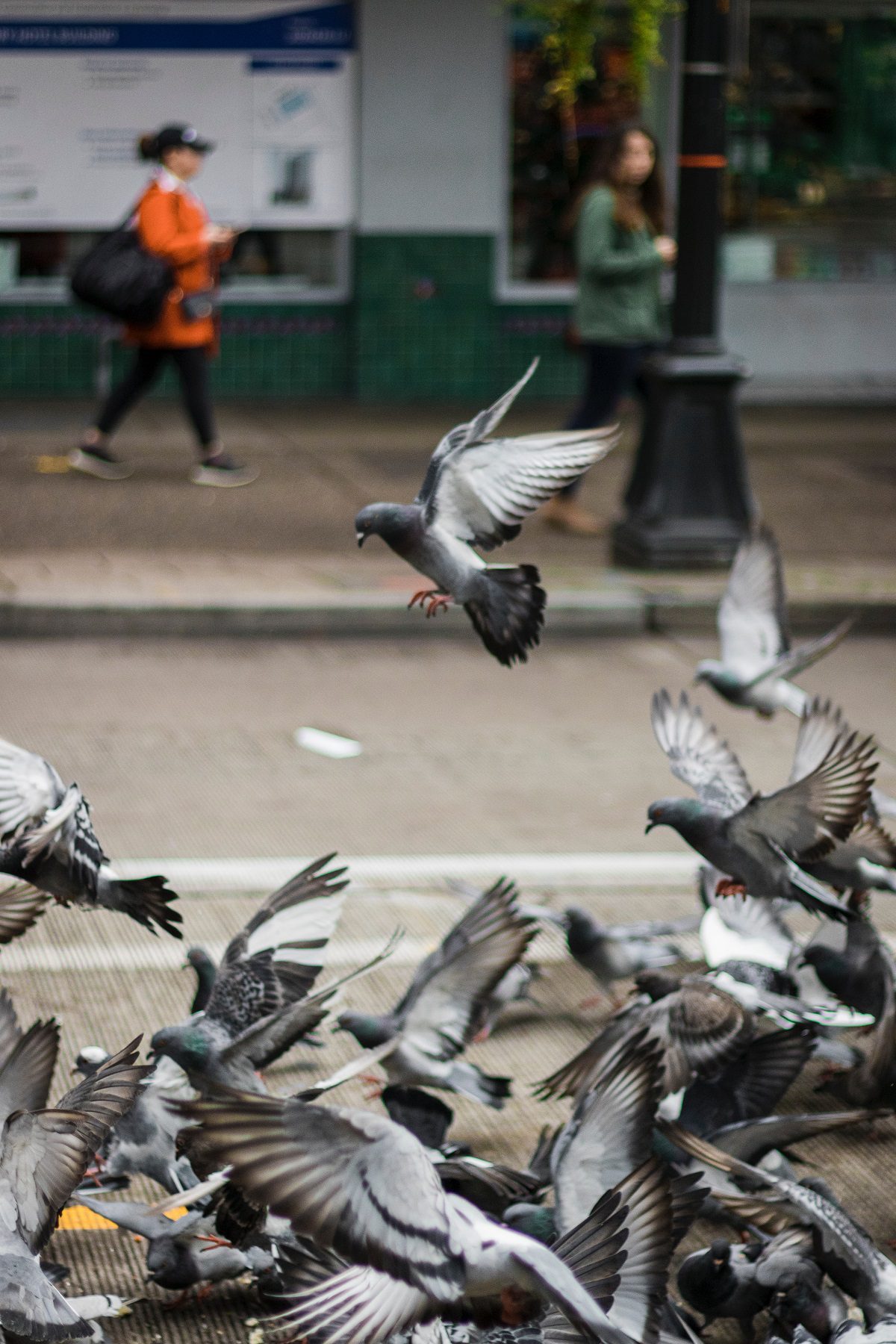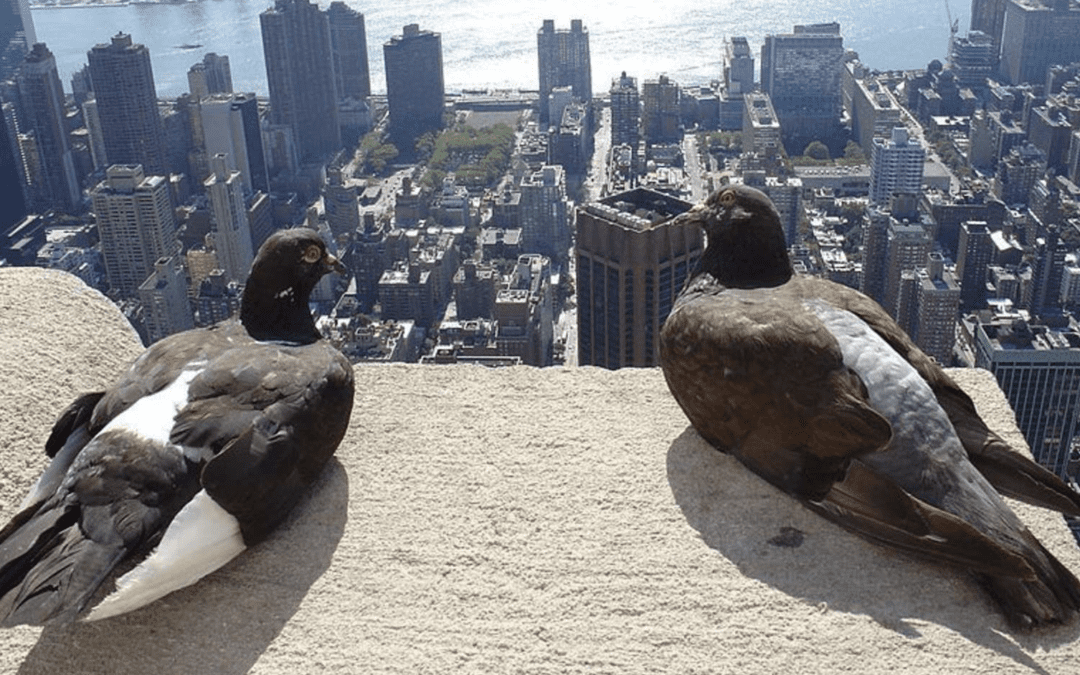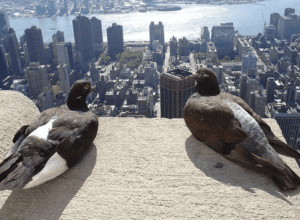
by Pigeon Patrol | Jan 19, 2023 | Bird Spike, Pigeon Droppings, Pigeon Patrol's Services, Pigeon Predators, Pigeon Spikes, Pigeons, Pigeons in the News, Raccoons
Dartmouth has a problem with pigeons and their droppings.
“They’re literally pooping in the lake,” said Emma Wattie, a water resource specialist with the Halifax Regional Municipality.
Feces from pigeons that roost under a bridge along Highway 111, between Lake Banook and Lake Micmac, has been identified as one of the bacteria sources in the water.
“There’s no barrier underneath, the bridge is essentially a throughway from the old canal system, the Shubenacadie Canal,” said Wattie. “Birds are literally roosting and their feces is entering the water.”
“There are hundreds of pigeons roosting underneath there,” said Jim Hunter, an environmental risk and compliance specialist with the municipality.
“It’s not only an environmental issue with the lake, it’s a problem for the paddlers as well going underneath the bridge.”
The municipality plans to force the pigeons out by installing environmentally friendly bird netting.
“It’s a nylon mesh, very fine mesh, that’ll keep any birds of any size in this area out and that way they won’t be able to roost any longer in that location,” said Hunter.
The project is expected to cost about $175,000 and will take four-to-six weeks to complete. The first step is for crews to clean and disinfect the entire underside of the bridge.
“The ultimate goal is that we have the pigeons roosting somewhere else — not under the bridge,” said Sam Austin, the area councillor.
“You think about that bridge, it’s not a natural environment, I mean a pigeon would maybe (roost) on a cliff, in a tree, something like this, normally, but under that bridge is pretty much a direct path from bird to lake.”
Vehicle and pedestrian traffic in the area will be unaffected while crews install the netting.
“For the people who paddle, or boat, on the lake, I would just urge you to be very cautious when you’re going through there, because one side is going to be closed and then they’ll flip to the other side and then the other side will close, so for the duration of construction, one of the lanes under the bridge is closed to boating,” said Austin.
It’s hoped less pigeons and what they leave behind will lead to fewer beach closures in the summer.
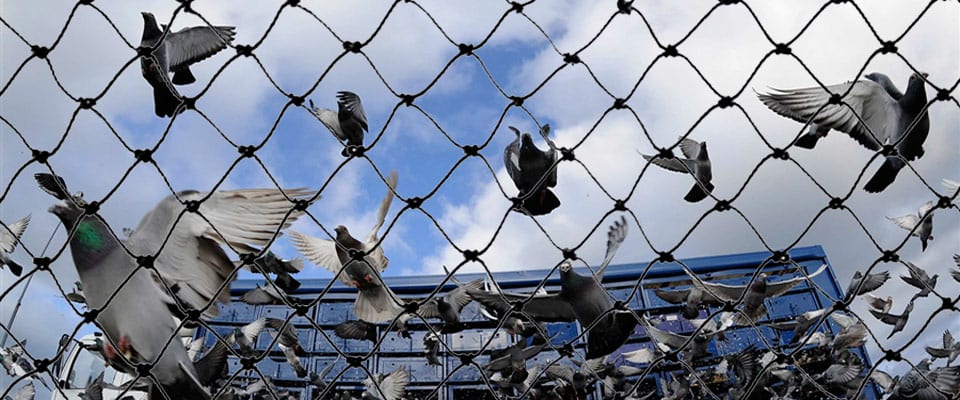
by Pigeon Patrol | Jan 19, 2023 | Bird Spike, Pigeon Predators, Pigeon Spikes, Pigeons, Pigeons in the News, Raccoons, Sparrows, UltraSonic Bird Control
That pigeon in your neighborhood may not be your typical bird. Seattle Animal Control Officer Kevin Mack reports several “banded” pigeons found in the city recently.
“We’ve received at least two banded racing pigeons in the last couple weeks,” said Mack. “And I’ve had at least three sightings of banded birds that were moving through the city.
“These birds are essentially identical to local feral pigeons you see in the city, Rock Pigeons. But they really are domesticated birds and they usually have owners that want them back.”
People who race pigeons usually have a coop at their residence. They raise the birds, register them with their organization of choice, and then race them.
The race consists of driving the pigeon a pre-determined distance from their coop, setting them loose, and then seeing how long it takes them to return. Some pigeons are better at homing than others so sometimes they get lost on their way back. Other times they get injured or just plain tired.
The American Racing Pigeon Union is one of the most popular pigeon racing groups. You can tell the pigeons belong to someone who belongs to the group because they have bands on their legs with the letters “AU” on them.
The site also has good information about how to read the information on the band and some links to other organizations for birds with other types of bands.
The pigeon that is being sheltered at the Seattle Animal Shelter is from Jeanerett, Louisiana because its band includes the local club code. “2022” is the bird’s hatch year and the long number found on the other side of the band is the bird’s unique identifier.
Source
Pigeon Patrol Products & Services is the leading manufacturer and distributor or bird deterrent (control) products in Canada. Pigeon Patrol products have solved pest bird problems in industrial, commercial, and residential settings since 2000, by using safe and humane bird deterrents with only bird and animal friendly solutions. At Pigeon Patrol, we manufacture and offer a variety of bird deterrents, ranging from Ultra-flex Bird Spikes with UV protection, Bird Netting, 4-S Bird Gel and the best Ultrasonic and audible sound devices on the market today.
Voted Best Canadian wholesaler for Bird Deterrent products ten years in a row.
Contact us at 1 877-4-NO-BIRD,(604) 585-9279 or visit our website at www.pigeonpatrol.ca
Pigeon/Pigeon Patrol / Pigeons Roosing / Vancouver Pigeon Control / Bird Spikes / Bird Control / Bird Deterrent / PIgeon Deterrent / Surrey Pigeon Control / Pest / Seagull deterrent / Vancouver Pigeon Blog / Birds Inside Home / Pigeons in the cities / Ice Pigeons / What to do about pigeons / sparrows, Damage by Sparrows, How to Keep Raccoons Away, Why Are Raccoons Considered Pests / De-fence / Pigeon Nesting / Bird Droppings / Pigeon Dropping / woodpecker control / Professional Bird Control Company / Keep The Birds Away / Birds/rats/seagull/pigeon/woodpecker/dove/sparrow/pidgeon control/pidgeon problem/pidgeon control/flying rats/pigeon problems/ bird netting/bird gel/bird spray/bird nails/bird guard
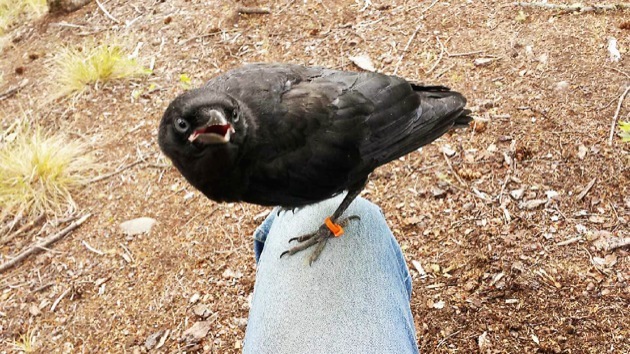
by Pigeon Patrol | May 14, 2022 | Animal Deterrent Products, Bird Law, Bird Netting, Bird Spike, Pigeon Spikes, Pigeons, Pigeons in the News
Greg Pigeon called a television station and told them: “That’s my crow.”
And a peculiar story in the British Columbia news got even more peculiar.
The interesting tale involves a Cariboo resident, a young guy on a bike and a crow “attack” in Vancouver, a video on the Internet, multiple news reports about that video, and now, contradictory stories about where this simultaneously pesky and charming bird named, Crow, with no fear of people and an orange zip tie around its foot, really came from.
According to reports, East Vancouver locals say the crow in question fell from its nest as a baby and people there nursed it back to health.
The crow stuck around and now it’s like their friendly neighbourhood crow, a sort of precocious feathered mascot of the community, hanging out at racetracks and soccer fields, entertaining children, flying around and brazenly pecking items from people’s pockets.
The bird apparently goes by many names down in the Lower Mainland: Crackers, Mr. Jack, Canuck and Jerome.
An East Vancouver resident who was featured in the reports calls him Crow. This is what Pigeon, a 108 Mile Ranch resident, calls him, too.
But Crow was raised in the Cariboo, Pigeon claims, not in Vancouver.
The way Pigeon tells it, he found Crow in the spring at his parent’s farm near Clinton. The baby bird fell from its nest and Pigeon’s son, Steven, took care of it when the family brought it home to 108 Mile Ranch, and raised it like a pet.
“It learned how to fly eventually,” says Pigeon. “It flew around our house and visited our neighbours and they got to know him.
“He just kept coming back. Eventually, he disappeared.”
Before the bird went missing around August, Pigeon tied an orange zip tie around its left foot to distinguish it from other crows in his yard.
Pigeon says there’s no doubt the crow on the news is the same crow. After all, he asks, what are the chances there are two strikingly social, heart-winning crows flying around B.C. – with the same colour zip tie on the same foot?
Reached via e-mail and asked about the likelihood of Pigeon’s crow being the same crow in the Vancouver news reports, Tom Dickinson, Dean of Science at Thompson Rivers University in Kamloops, says the orange strap on the bird’s leg is “a perfect match” and he suspects it is the same bird and Pigeon’s story is true.
“Only two ways to get there: fly or hitch hike,” explains Dickinson, whose research includes bird communities in high elevation forests.
“It isn’t that far to go, especially if there is favourable wind and weather. But given how tame this [crow] looks, it is at least equally likely he was foraging inside a truck bed (or the like) and maybe didn’t get out before the door slammed and found himself in Kerrisdale.”
Pigeon shares a similar theory. But no matter how the bird made its way south, he just hopes Crow eventually makes his way back up to the Cariboo, and hopes no one hurts him in the meantime.
“If he seems to be a pain the butt, the main thing is ignore him and he’ll find someone else. If you feed him, he’s going to continue staying around.
“If he’s in 100 Mile, let me know,” Pigeon adds.
“He’s more than welcome around our house. We enjoyed having him around.”
Pigeon Patrol Products & Services is the leading manufacturer and distributor of bird deterrent (control) products in Canada. Pigeon Patrol products have solved pest bird problems in industrial, commercial, and residential settings since 2000, by using safe and humane bird deterrents with only bird and animal friendly solutions. At Pigeon Patrol, we manufacture and offer a variety of bird deterrents, ranging from Ultra-flex Bird Spikes with UV protection, Bird Netting, 4-S Bird Gel and the best Ultrasonic and audible sound devices on the market today.
Voted Best Canadian wholesaler for Bird Deterrent products ten years in a row.
Contact us at 1- 877– 4– NO-BIRD, (604) 585-9279 or visit our website at www.pigeonpatrol.ca
Pigeon/Pigeon Patrol / Pigeons Roosting / Vancouver Pigeon Control /Bird Spikes / Bird Control / Bird Deterrent / Pigeon Deterrent? Surrey Pigeon Control / Pest /Seagull deterrent / Vancouver Pigeon Blog / Birds Inside Home / Pigeons in the cities / Ice Pigeons/ What to do about pigeons/ sparrows , Damage by Sparrows, How To Keep Raccoons Away, Why Are Raccoons Considered Pests/ De-fence / Pigeon Nesting/ Bird Droppings / Pigeon Dropping/ woodpecker control/ Professional Bird Control Company/ Keep The Birds Away/ Birds/rats/ seagull/pigeon/woodpecker/ dove/sparrow/pidgeon control/pidgeon problem/ pidgeon control/flying rats/ pigeon Problems/ bird netting/bird gel/bird spray/bird nails/ bird guard

by Pigeon Patrol | Mar 21, 2022 | Bird Spike, Pigeon Predators, Pigeon Spikes, Pigeons, Pigeons in the News, Raccoons, Sparrows, UltraSonic Bird Control
Watch out, pigeons… there’s a new cop in town! The Nevada Pigeon Control is a local business that pledges to contain the pigeon problem. They’ve got uniforms, cages, and air guns… all aimed at cutting down on the number of winged beasts. They say the county isn’t taking care of the bird problem. But Clark County says it will use pigeon birth control pills. Why are pigeons such a problem in Southern Nevada? Why are casinos hiring uniformed men with air guns? And why are so many groups all aflutter over the best way to handle this controversy? We talk to a “pigeon cop” and others tackling bird control. Fly into the conversation below.

Source
Pigeon Patrol Products & Services is the leading manufacturer and distributor of bird deterrent (control) products in Canada. Pigeon Patrol products have solved pest bird problems in industrial, commercial, and residential settings since 2000, by using safe and humane bird deterrents with only bird and animal friendly solutions. At Pigeon Patrol, we manufacture and offer a variety of bird deterrents, ranging from Ultra-flex Bird Spikes with UV protection, Bird Netting, 4-S Bird Gel and the best Ultrasonic and audible sound devices on the market today.
Voted Best Canadian wholesaler for Bird Deterrent products ten years in a row.
Contact us at 1- 877– 4– NO-BIRD, (604) 585-9279 or visit our website at www.pigeonpatrol.ca
Pigeon/Pigeon Patrol / Pigeons Roosting / Vancouver Pigeon Control /Bird Spikes / Bird Control / Bird Deterrent / Pigeon Deterrent? Surrey Pigeon Control / Pest /Seagull deterrent / Vancouver Pigeon Blog / Birds Inside Home / Pigeons in the cities / Ice Pigeons/ What to do about pigeons/ sparrows , Damage by Sparrows, How To Keep Raccoons Away, Why Are Raccoons Considered Pests/ De-fence / Pigeon Nesting/ Bird Droppings / Pigeon Dropping/ woodpecker control/ Professional Bird Control Company/ Keep The Birds Away/ Birds/rats/ seagull/pigeon/woodpecker/ dove/sparrow/pidgeon control/pidgeon problem/ pidgeon control/flying rats/ pigeon Problems/ bird netting/bird gel/bird spray/bird nails/ bird guard
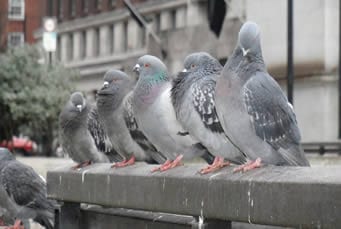
by Pigeon Patrol | Mar 21, 2022 | Bird Spike, Pigeon Patrol's Services, Pigeon Predators, Pigeon Spikes, Pigeons, Pigeons in the News
I never thought much about pigeon excrement until I moved into a condo several years ago and discovered two birds nesting on the balcony. Because my daughter was worried about the cute little eggs, I waited till the squabs were old enough to fly before clearing out the nest and piles of excrement, along with all my pigeon-defaced outdoor furniture. Then a building reno temporarily solved the problem, but as soon as the jackhammers stopped, the pigeons were back and defecating with impunity.
I decided to take action, and quickly discovered some hard facts. Pigeons, instead of nesting in trees, prefer buildings, especially tall buildings with ledges and balconies – i.e., condos. This was bad news in a city undergoing an extended real-estate boom, and this past week analysts were guessing the condo market’s record growth (about 40,000 a year for the past five years) will continue at least until 2010 – which means even more condos, i.e., more perfect pigeon abodes, i.e., more excrement.
Though there’s no pigeon census, many Toronto residents are feeling plagued by pigeons this summer. And it’s possible the rise of condos will increase the pigeon population, says Tom Mason, curator of invertebrates and birds at the Toronto Zoo.
“As the human population has increased, the pigeon population has increased with it.”
Homeowners are complaining of backyard birdfeeders being overrun with pigeons. And certain areas – like the “pigeon gauntlet” north of Broadview subway station – have become legendary. “When they’re not feasting on bread strewn by crazy old people, they’re packed onto the hydro lines above,” says a Riverdale resident. She cited a recent incident involving a man in a crisp suit, “obviously a stranger to the neighbourhood,” who walked straight under the line of fire. “It looked like someone had upended a container of yogurt on him, honestly, it was that copious. He started running around in circles, screaming, then ran off.”
So Toronto’s pigeon problem was bigger than I’d bargained for – but surely I could get them off my own balcony. I started with humane pigeon deterrents: a bobble-headed “scary” owl, fluttering strips of aluminum foil, twirly children’s toys. Nothing worked.
Whenever I heard pigeons cooing on the balcony, I hammered on the window, or leaped out the door shrieking, “Get out of here, you bastards!” In fact, I got so used to the routine that I stopped explaining the outbursts during business calls. As the battle escalated, I laid in wait with water guns, ambushing the enemy as they landed on my railing, or sneaking over to my neighbour’s balcony – where I knew pigeons were nesting behind a deck chair. There, I would jump up, crane around the partition and blast away at the cornered pigeons as they ran around in circles. One day, it occurred to me that I might encounter – and shoot – the neighbour, so I stopped.
It was time to do more research.
Know the enemy
Toronto’s feral pigeons are descended from domestic birds brought over by early settlers. Males and females look the same, are monogamous and take turns incubating eggs, which arrive two at a time. Both parents nurse the babies with a nutrient-laden “crop milk,” which can double the wee ones’ weight in 34 hours.
“What’s also amazing,” said ornithologist Mark Peck of the Royal Ontario Museum, “is that, as far as I know, they are the only bird in Ontario that breeds throughout the entire year,” which means up to nine “clutches” per annum.
Pigeons are also uniquely skilled at navigation – able to fly 70 kilometres per hour, covering up to 1,000 kilometres in a single race. In wartime, pigeons saved lives by carrying military messages across enemy lines. Science hasn’t figured out the exact mechanism, but the motivation, explains the zoo’s Mr. Mason, is that they’re frantically trying to get back to their nestlings.
This is the trouble with research. You seek data to support a pigeon-killing spree, and you end up discovering pigeons are a lot like humans, except pigeons have a lower divorce rate.
So let’s not forget their capital offences. The Nixalite Architectural Bird Control website states that pigeons are “a vector for more than 50 human and livestock diseases.” Their droppings fade finishes on cars and planes, can destroy wood, stone and marble, corrode I-beams, ruin cloth awnings, short out electrical equipment and fill attics with so much excrement “that the actual ceiling collapses.”
On an excrement-removal website, the U.S. General Services Administration warns that pigeon excrement can “lead to potentially fatal diseases of the lungs and central nervous system such as histoplasmosis and cryptococcosis.”
In fact, the Web is packed with anti-pigeon content. The problem: There seems to be no evidence of pigeon-caused plagues in real life. “That’s correct,” said Dr. David McNeely, associate professor of infectious diseases at University of Toronto. Avian-related diseases are rare to begin with, he said, and they’re usually caused by other species. “Don’t pick on poor pigeons,” Dr. McNeely said. “If you want to worry about bird-related diseases, worry about budgie dander.”
Similarly, Mr. Mason, who works at the zoo with pigeons and other birds daily, has never heard of a case. Nor has Mr. Peck at the ROM, who adds how important pigeons have been to science, from Darwin and B.F. Skinner to the present. “Pigeons are not bad birds,” Mr. Peck said. “They’re just successful.”
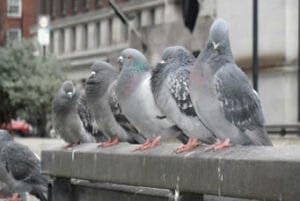
Taking action
These scientist types weren’t helping my case against pigeons at all. I phoned the city to ask if it was legal to kill them. “There are no bylaws that apply to wild pigeons,” said Rishma Govani in the public health department, though “there are rules” about owned pigeons.
Next, I spoke with Donald Fraser, principal of Beacon Environmental impact-assessment (and a former researcher on goose defecation habits, which I figured was close enough to my area of interest), who explained: “It is legal to shoot or kill pigeons because they are a non-migratory bird, and thus not covered by the migratory bird act between Canada and the United States.” You need a permit to shoot gulls, or a hunting licence to shoot geese or ducks, for example, but pigeons are fair game. Mr. Fraser did caution, however, that there might be consequences if firearms were discharged within the city.
Indeed, Constable Wendy Drummond of Toronto Police Services confirmed that, while feral pigeons were not protected by the Criminal Code (the sections on animal cruelty pertain mainly to owned animals such as cattle, she said), any discharge of a pellet gun with intent to kill would result in a weapons charge. Snapping their little necks, quickly and humanely, would be tolerated, she said, “unless, you know, we find 100 dead pigeons.”
So pigeons are good family birds, heroic during wartime and, as Mr. Fraser also pointed out, good scavengers who help keep city streets clean (when not filling them with excrement, that is, but never mind). So maybe we shouldn’t kill them. But feed and encourage them? No way.
On this point, I agreed with London Mayor Ken Livingstone, who reduced pigeon numbers in Trafalgar Square by imposing a controversial feeding ban in 2003. A friend recommended I speak to a woman who fed pigeons in her local park. Oh goody, I thought – my anti-pigeon case would definitely be enhanced by a real-live wacko, probably wearing old rags and a squashed hat covered in excrement, ranting about pigeon rights.
Well, the crazy pigeon lady turned out to be novelist Barbara Gowdy, who may or may not be as deranged as the next writer, but who is undeniably smart, attractive, well-groomed and socially responsible.
“I only feed them at the end of the park, away from homes, during inclement weather, when there is snow and ice on the ground and it’s impossible for them to get food,” Ms. Gowdy said.
For a while, when people attacked her for feeding pigeons, she handed out pamphlets from the Centers for Disease Control and Prevention, which stated, she said, that “even if you ate pigeon excrement, the only thing you’d get is a mild stomach ache.”
Ms. Gowdy is nothing if not persuasive. Or maybe I was ready to crack. After starting out on a crusade to kill all pigeons, I now considered eating pigeon excrement in order to properly research this article.
In any case, the fight had gone out of me – mainly, I think, because of one detail I couldn’t get out of my head: The reason pigeons love condos is because the high-rise towers resemble ancient cliff faces, near Asian seas, where rock doves originally made their homes. That image of our city’s condos as soaring cliffs along the edge of Lake Ontario transformed my view of both the buildings and pigeons.
Ms. Gowdy was right: Toronto’s feral rock pigeons have as much right to live here as we do, and the city would be a much poorer place without its wild animals. I’m willing to live and let live – though it would still be nice to find a way to stop them from living on my particular balcony.
Source
Pigeon Patrol Products & Services is the leading manufacturer and distributor of bird deterrent (control) products in Canada. Pigeon Patrol products have solved pest bird problems in industrial, commercial, and residential settings since 2000, by using safe and humane bird deterrents with only bird and animal friendly solutions. At Pigeon Patrol, we manufacture and offer a variety of bird deterrents, ranging from Ultra-flex Bird Spikes with UV protection, Bird Netting, 4-S Bird Gel and the best Ultrasonic and audible sound devices on the market today.
Voted Best Canadian wholesaler for Bird Deterrent products ten years in a row.
Contact us at 1- 877– 4– NO-BIRD, (604) 585-9279 or visit our website at www.pigeonpatrol.ca
Pigeon/Pigeon Patrol / Pigeons Roosting / Vancouver Pigeon Control /Bird Spikes / Bird Control / Bird Deterrent / Pigeon Deterrent? Surrey Pigeon Control / Pest /Seagull deterrent / Vancouver Pigeon Blog / Birds Inside Home / Pigeons in the cities / Ice Pigeons/ What to do about pigeons/ sparrows , Damage by Sparrows, How To Keep Raccoons Away, Why Are Raccoons Considered Pests/ De-fence / Pigeon Nesting/ Bird Droppings / Pigeon Dropping/ woodpecker control/ Professional Bird Control Company/ Keep The Birds Away/ Birds/rats/ seagull/pigeon/woodpecker/ dove/sparrow/pidgeon control/pidgeon problem/ pidgeon control/flying rats/ pigeon Problems/ bird netting/bird gel/bird spray/bird nails/ bird guard




